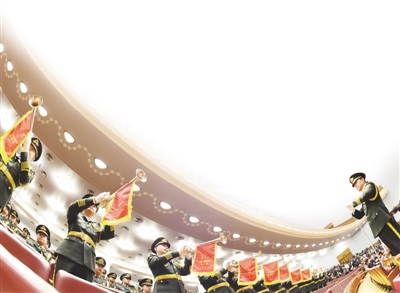
The PLA Military Orchestra played the swearing-in ceremony in the Great Hall of the People. Photo by Sun Xiaomeng
This is the first time since the founding of the Republic that a grand constitutional oath ceremony was held at the National People’s Congress. The people of the whole country witnessed this solemn and sacred process through television cameras.
As part of the swearing-in ceremony of the national leaders’ constitution, the two pieces of music, the swearing-in ceremony song and the chairman’s horn, were specially created by the PLA Military Orchestra and have not been played in public before.
"Now hold the constitutional oath ceremony of the first meeting of the 13th National People’s Congress of the People’s Republic of China!" At 10: 50 am on March 17th, a solemn and powerful bugle sounded at the Great Hall of the People. With the music played by the Military Orchestra of China People’s Liberation Army, the swearing-in ceremony of the Constitution kicked off. The ceremonial soldiers marched forward, escorting the Constitution of People’s Republic of China (PRC) and placing it on the oath platform.
接着,新当选的国家主席、中央军委主席习近平从主席团座席起身走向宣誓台时,又一段铿锵激昂的号角奏响,将整个宪法宣誓仪式烘托得更加神圣与庄严。
创 作
“今年2月初,全国人大交给我们一项任务——为宪法宣誓仪式创作一首乐曲。”解放军军乐团副团长张海峰告诉记者。
这样的创作,看似开放自由,实则限制颇多,音乐的时长、风格、元素等都需要考虑仪式的实际情况。
军乐团经过研究,首先将音乐形式确定为号角。“号角,有昭示的含义。”在宪法宣誓仪式中,宣誓人庄重地诵读誓词是整个仪式最重要最核心的部分。在此之前演奏号角,昭示神圣的一刻即将来临,最为合适。
“第一,选用国歌作为音乐素材;第二,最后以长音收尾;第三,乐曲的配器增加长号。”代表军乐团在人民大会堂里工作了34年的张海峰根据自己的经验给创作者提出建议。
在这样重要的场合上,使用的音乐元素需要慎重考虑,国歌无疑非常合适——它是国家的象征,足够庄重,仪式感强。
乐曲以长音结尾,则蕴含微调的妙处。“举行宪法宣誓仪式时,宣誓人既可能是一位领导人,也可能是数位领导人,走到宣誓台前的脚步有快有慢。以长音收尾,便于根据实际情况对尾音做出调整。”张副团长说。
至于乐器的选用,“通常说来,号角用小号作为主要乐器。但增加长号后,声部可以由3个变为8个。”短短20秒的乐曲才能够表现足够丰富的内涵。
最终,创作了“9·3”阅兵号角、2018年元旦天安门升旗号角等作品的解放军军乐团创作室副主任郭思达完成了作曲任务。作品交回人大审定后,获得通过。军乐团又收到建议,再创作一首。
“新的曲子可以使用国际歌作为素材,并增加乐器小军鼓。”张海峰从党代会闭幕式上演奏的国际歌得到灵感。
最终,第一首曲子被选作宣誓仪式曲,第二首曲子由于打击乐的加入,节奏感强,更加激昂奋发、铿锵有力,成为主席出场号角。
准 备
解放军军乐团此次演奏宣誓仪式曲和主席出场号角时,在形式上做出了特别安排——通常只用在室外举行的国家典礼上的礼号,首次走进了人民大会堂。八面号旗挂在微微上扬的号管上,给人以耳目一新的感觉,仪式感更强,烘托典礼的隆重。
In order to ensure that there are no mistakes in the performance at the constitutional oath ceremony, "I went to the General Assembly Hall to rehearse for five times." As the conductor of live performance at the venue, Zhang Haifeng said.
However, the first rehearsal found problems. Generally, when a band plays, a certain distance will be left between the conductor and the musician, so that the musician can observe the conductor’s movements. However, limited by the space in the Great Hall of the People, there is only one row of seats between the conductor and the first row of musicians, and the stations are almost parallel. In the past, the band could make trombone players stand back by adjusting their formation. But this time, there are only eight trumpeters, eight trombones and two military drummers. In this way, the distance between the trombone player and the conductor is too close, and the line of sight is just blocked by the horn of the trombone, and the conductor’s action is completely invisible.
In order to solve this problem, the military orchestra asked the musical instrument support personnel who should have been sitting in the back row to leave to make room, and the musicians moved back two rows as a whole.
Play
Eighteen performers of the PLA Military Orchestra have been carefully selected from the orchestra and participated in many important performance activities. They are of excellent quality and confident in their performances.
However, because of the many "firsts" of activities, there is no experience to refer to, and I am still nervous. "The procedures for swearing-in activities need to be remembered in particular." For example, before president and the chairman of the Central Military Commission take the oath, the host of the conference will first announce the ceremony, and then broadcast it once by the live broadcast host of the conference. At this time, the performance will start; Before the vice chairman and members of the Central Military Commission take the oath collectively, the host of the live broadcast will increase the password of "Please take the oath in place".
Before the performance, although Zhang Haifeng had memorized the procedure, his heart was still tense. The same is true for musicians. "At that time, some trumpeters were already inhaling and ready to play, but I couldn’t beat until the password was finished." Zhang Haifeng said, "All the comrades in the regiment are sweating for me."
At the end of the performance, Zhang Haifeng felt proud and lucky. Proud, he participated in such groundbreaking activities on such a solemn and sacred occasion as a live conductor on behalf of the military orchestra. Fortunately, he caught up with the new era. Since the 18th National Congress of the Communist Party of China, the frequency of military orchestras participating in major foreign affairs activities has become higher and higher, which has made him personally feel that the international status of the motherland is constantly improving and the country’s development is getting better and better.
Tips and representative works
The Military Orchestra of China People’s Liberation Army belongs to the Political Work Department of the Central Military Commission. Formerly known as the North China Military Region Military Band established in January 1948. In 1949, he participated in the founding ceremony in New China as the main band and played National Anthem of the People’s Republic of China for the first time. It was formally expanded and established in 1952.
Over the years, the Military Orchestra has composed and performed more than 2,000 wind music works in different forms, and recorded and distributed hundreds of wind music tapes, records, music scores and monographs. Representative works include: Welcome March (Wei Qun), Farewell March (Zheng Lu), Flowers Song (Yan Xiao ‘ou), Athletes March (Jia Shuang), Horn of Handover Ceremony of Hong Kong and Macao (Wang Hesheng), Divided March (Luo Lang) and so on. (Reporter Shen Zhilin)